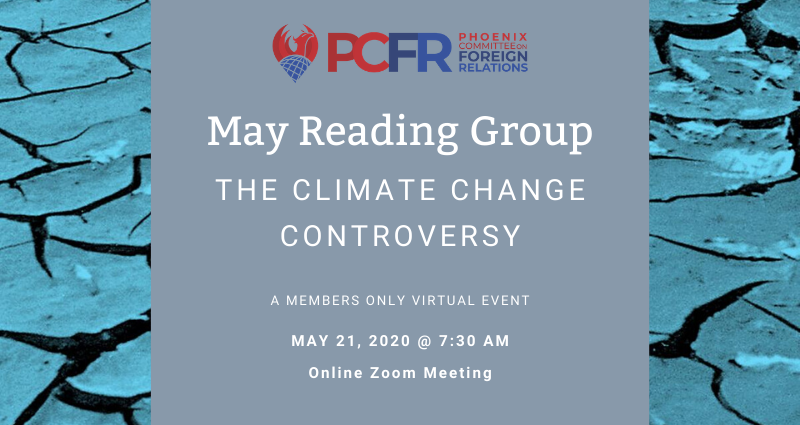
May Reading Group
The Climate Change Controversy
Thursday, May 21, 2020
7:30 - 9:00 am
Venue
Online Zoom Meeting.
Topic of Discussion
The climate change issue is a classic case of Pascal’s Wager, named after the famous 17th century philosopher/ mathematician who is known for his probability theories. How does Pascal help us to understand the climate change controversy? Well, climate changers fall into three basic categories; those who believe in the negative effects of short and long term changes in climate, those who believe that if there are negative effects of climate change, they are in the future and those who deny that there are negative effects at all, but, if they do exist, they are minimal.
Pascal presented a wager to all that doubted the existence of God. Their choice would determine Heaven or Hell at their death. Only two choices are available; God does exist or God does not exist. If you choose God does not exist and he does not exist, nothing happens to you. If you choose God does not exist and he does exist, you go to Hell. If you choose God exists and he does not exist, again nothing happens to you, but if God does exist, you go straight to Heaven. Well, even a non mathematician can see that the optimal decision is to wager that God exists.
Now, what if a similar wager was given to citizens of the world asking them to choose to be either a climate change believer or a climate change denier! Which would they choose? Indeed, which one would you choose? In the next PCFR ZOOM book review meeting, we will do precisely that, ask you to make the choice. We recommend that you read the articles on climate change in this month’s (May/June) issue of Foreign Affairs. We have selected three articles for you. If you wish to read the remaining four articles contact Matthew Totlis (mtotlis@asu.edu or 520/282-3010) and he will send you a link to these articles. We caution you to, at least, read carefully these articles and remind you that the future outcome of climate change will determine if you will experience Heavenly Bliss or Horrible Damnation. Hopefully, there will be some options in the middle.
The authors of these articles are very well qualified. William Nordhaus is the Sterling professor of economics at Yale University (taught there since 1967) and the co-author with Paul Samuelson of the world’s most famous undergraduate economics textbook of all time. William Nordhaus and Paul Romer received the prestigious Nobel Prize for low-emission energy technologies suggesting the use of pollution permits as a partial solution to the carbon emissions dilemma. In addition to Pascal’s Wager, Nordhaus explains how the climate change controversy exemplifies what political economists call the ‘Prisoner’s Dilemma’, an attempt by some citizens to get legislators to choose a cooperative strategy to mitigate the negative effects of climate change, but unfortunately seeing their efforts blocked by other citizens who have become ‘free riders’, that is, citizens who receive free benefits without bearing the social costs paid by others.
The other two articles are by former Republican secretaries of state, James Baker and George Schultz, The Strategic Case for U.S. Climate Leadership, How Americans Can Win With a Pro-Market Solution and Professor Rebecca Henderson ‘s The Unlikely Environmentalists, How The Private Sector Can Combat Climate Change.
Other articles in Foreign Affairs are written by John Podesta and Todd Stern former Obama advisors on climate change. They describe “… a road map for overhauling American foreign policy”, Professor Kathy McLeod (Director of the Resilience Center at the Rockefeller Foundation, advocating the crucial role of local communities to foster positive behavioral attitudes needed for climate change and, finally, Mohamed Adow (member of the Christian Relief Agency) who argues that since poor countries are most vulnerable to climate change, the developed nations should step up efforts to increase foreign assistance.
Please join us for a lively and always controversial debate on this exciting foreign policy issue.
